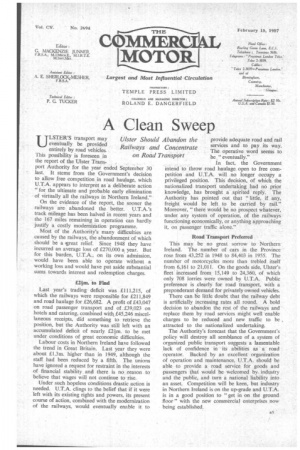A Clean Sweep
Page 39

If you've noticed an error in this article please click here to report it so we can fix it.
ULSTER'S transport may eventually be provided entirely by road vehicles. This possibility is foreseen in the report of the Ulster Transport Authority for the year ended September 30 last. It stems from the Government's decision to allow free competition in road haulage, which U.T.A. appears to interpret as a deliberate action "for the ultimate and probable early elimination of virtually all the railways in Northern Ireland."
On the evidence of the report, the sooner the railways are abandoned the better. U.T.A.'s track mileage has been halved in recent years and the 167 miles remaining in operation can hardly justify a costly modernization programme.
Most of the Authority's many difficulties are caused by the railways, the abandonment of which should be a %mat relief. Since 1948 they have incurred an average loss of £270,000 a year. But for this burden, U.T.A., on its own admission, would have been able to operate without a working loss and would have put aside substantial sums towards interest and redemption charges.
£2-Ini. to Find Last year's trading deficit was £111,215, of which the railways were responsible for £211,849 and road haulage for £26,682. A profit of £43,047 on road passenger transport and of £39,023 on hotels and catering, combined with £45,246 miscellaneous receipts, did something to retrieve the position, but the Authority was still left with an accumulated deficit of nearly £21m. to be met under conditions of great economic difficulties.
Labour costs in Northern Ireland have followed the trend in Great Britain. Last year they were about £1.3m. higher than in 1949, although the staff had been reduced by a fifth. The unions have ignored a request for restraint in the interests of financial stability and there is no reason to believe that wages will not continue to rise.
Under such hopeless conditions drastic action is needed. U.T.A. clings to the belief that if it were left with its existing rights and powers, its present course of action, combined with the modernization of the railways, would eventually enable it to provide adequate road and rail services and to pay its way. The operative word seems to be "eventually."
In fact, the Government intend to throw road haulage open to free competition and U.T.A. will no longer occupy a privileged position. This decision, of which the nationalized transport undertaking had no prior knowledge, has brought a spirited reply. The Authority has pointed out that "little, if any, freight. would be left to be carried by rail." Moreover, "there would be no prospect whatever, under any system of operation, of the railways functioning economically, or anything approaching it, on passenger traffic alone."
Road Transport Preferred This may be no great sorrow to Northern Ireland. The number of cars in the Province rose from 43,252 in 1948 to 84,403 in 1955. The number of motorcycles more than trebled itself from 6,161 to 21,011. On the goods side, Ulster's fleet increased from 15,149 to 24,360, of which only 708 lorries were owned by U.T.A. Public preference is clearly for road transport, with a preponderant demand for privately owned vehicles.
There can be little doubt that the railway debt is artificially increasing rates all round. A bold decision to abandon the rest of the railways and replace them by road services might well enable charges to be reduced and new traffic to be , attracted to the nationalized undertaking.
The Authority's forecast that the Government's policy will destroy all semblance of a system of organized public transport suggests a lamentable lack of confidence in its abilities as a road operator. Backed by an excellent organization Of operation and maintenance, U.T.A. should be able to provide, a road service for goods and passengers that would be welcomed by industry and the public, and turn a national liability into an asset. Competition will be keen, but industry in Northern Ireland is on the up-grade and U.T.A. is in a good position to "get in on the ground floor" with the new commercial enterprises now being established.




















































































































